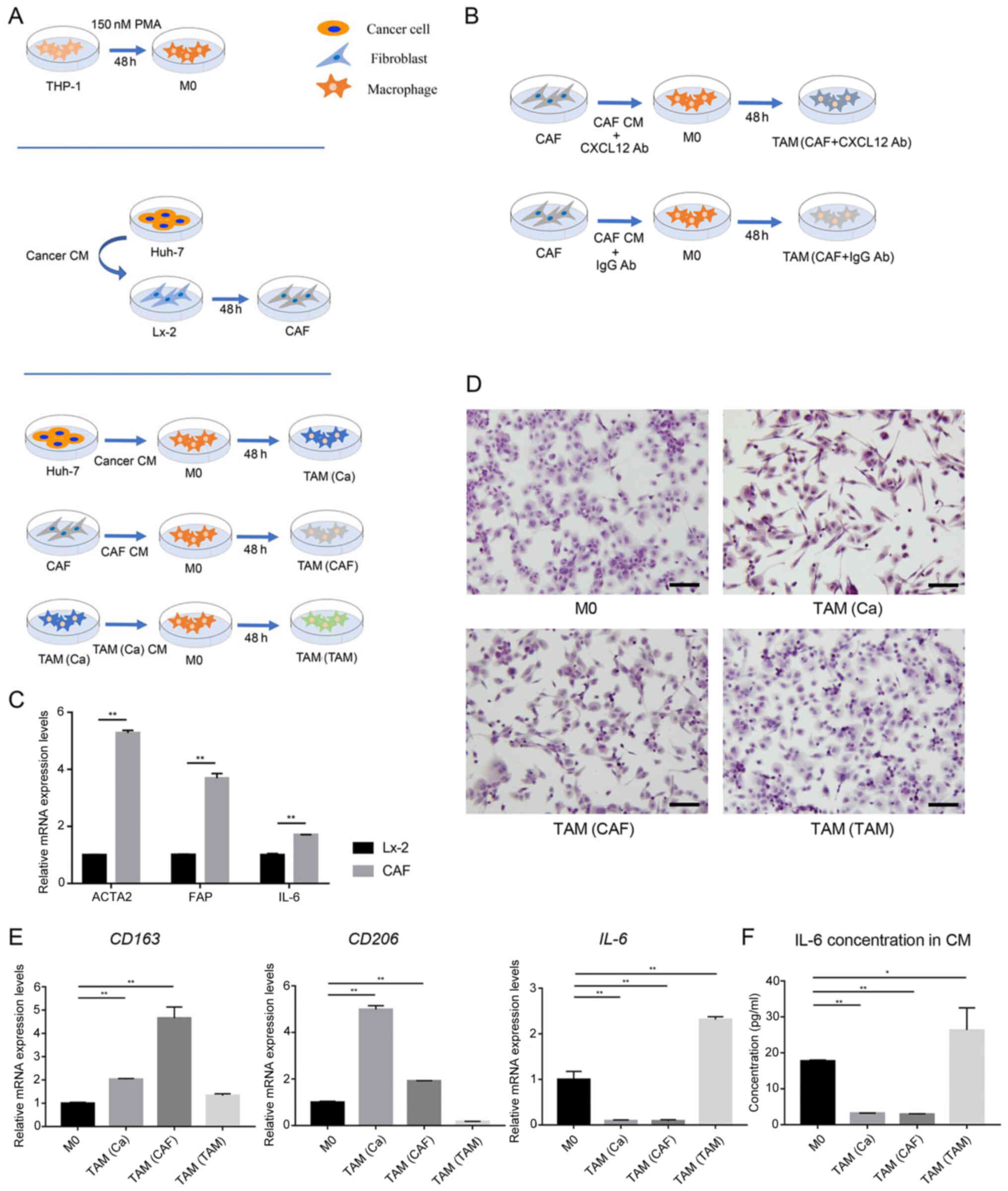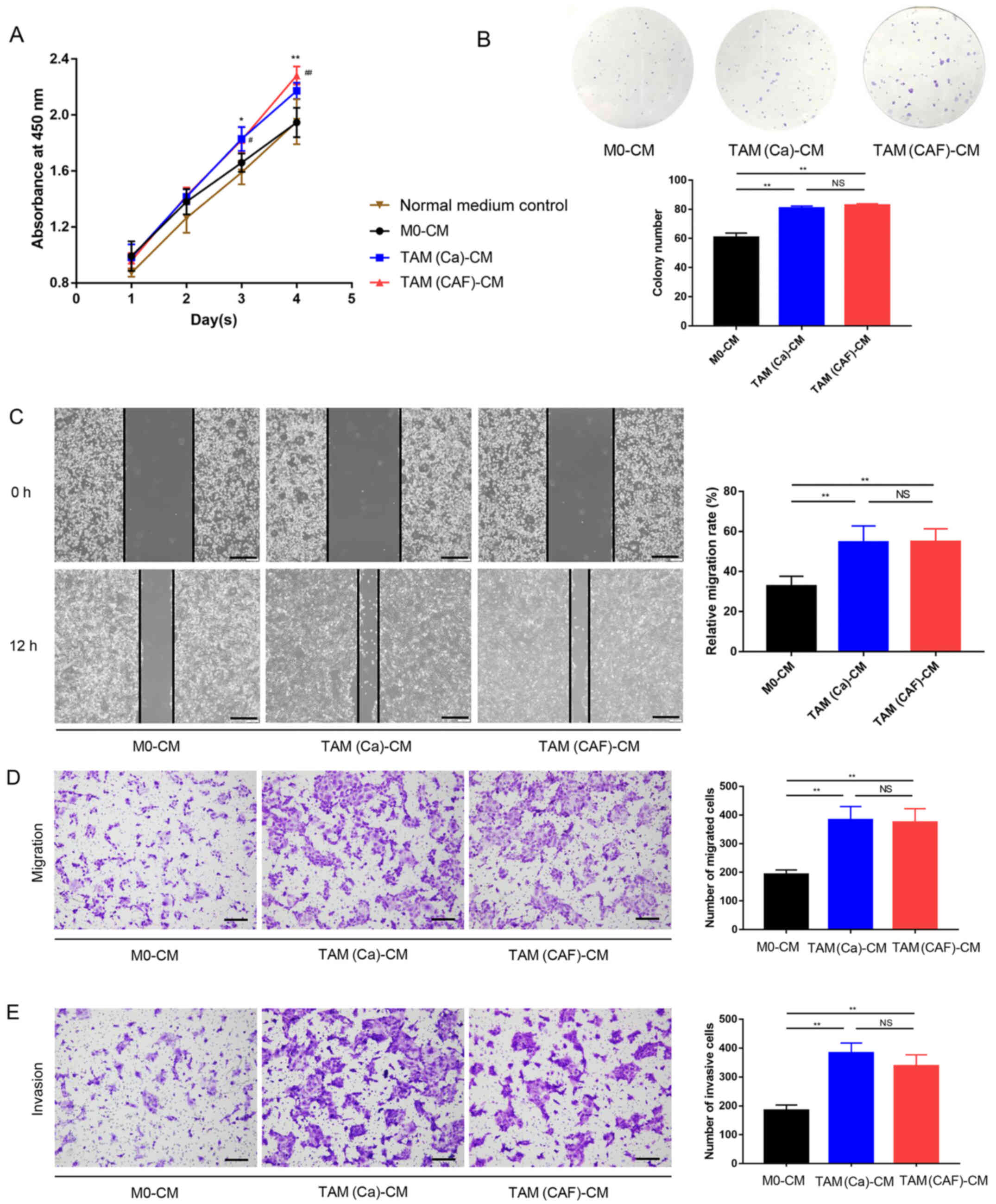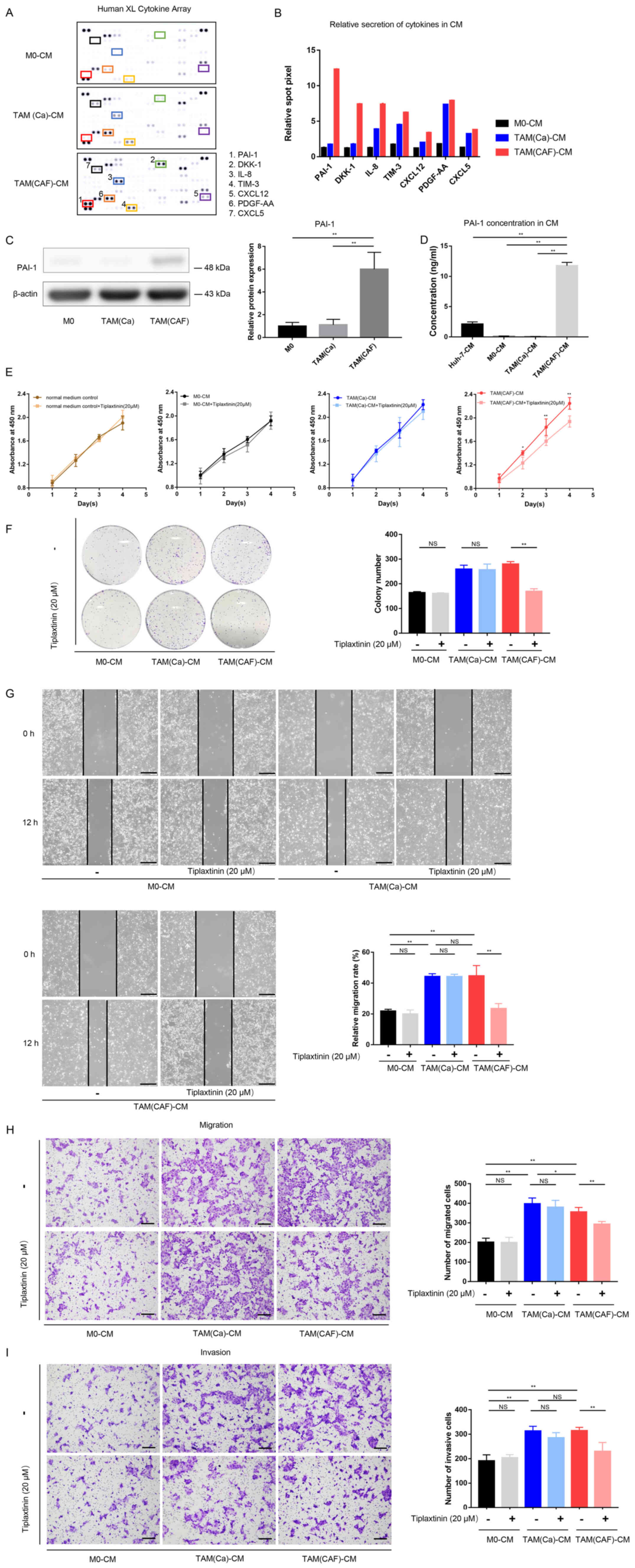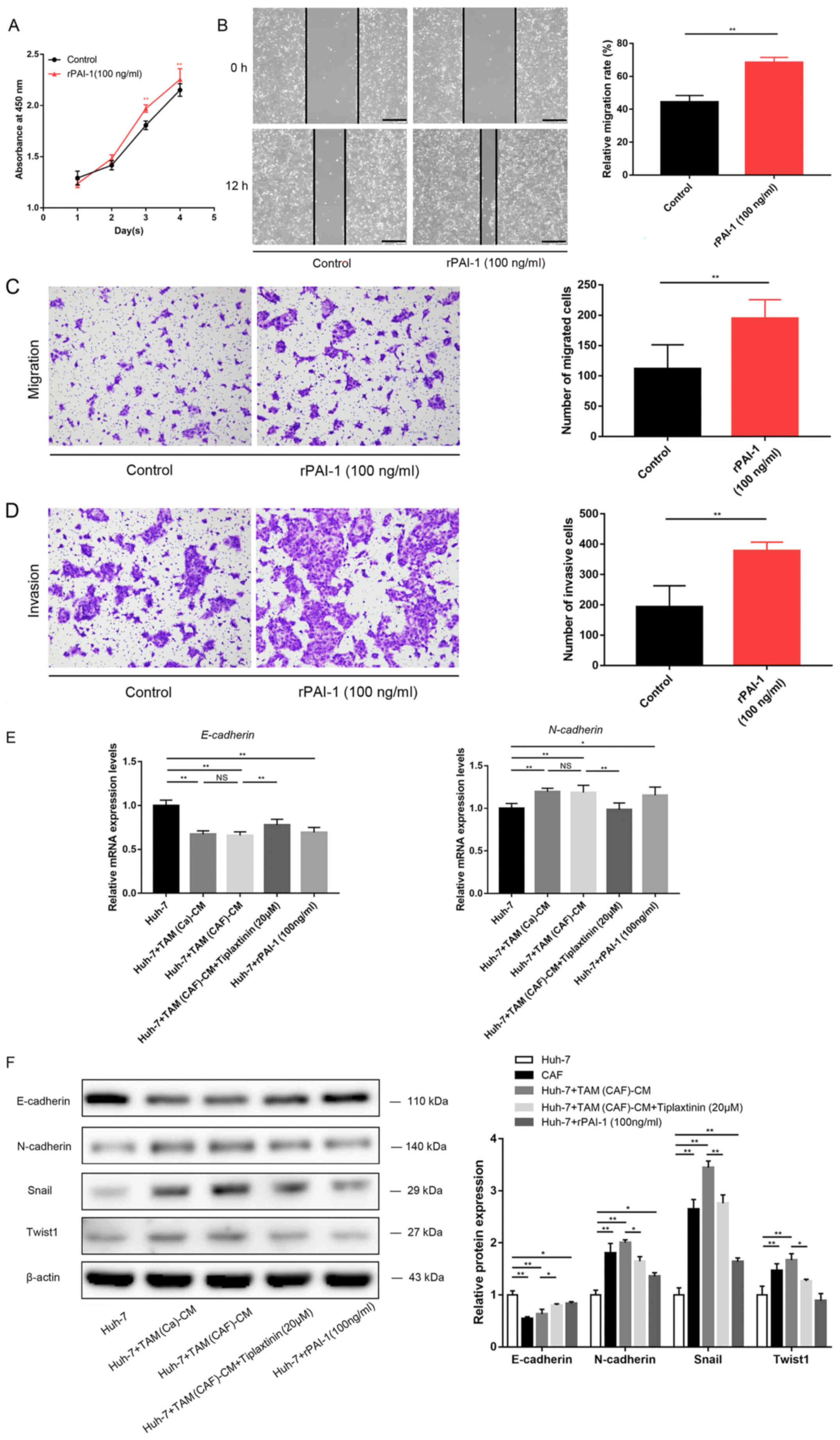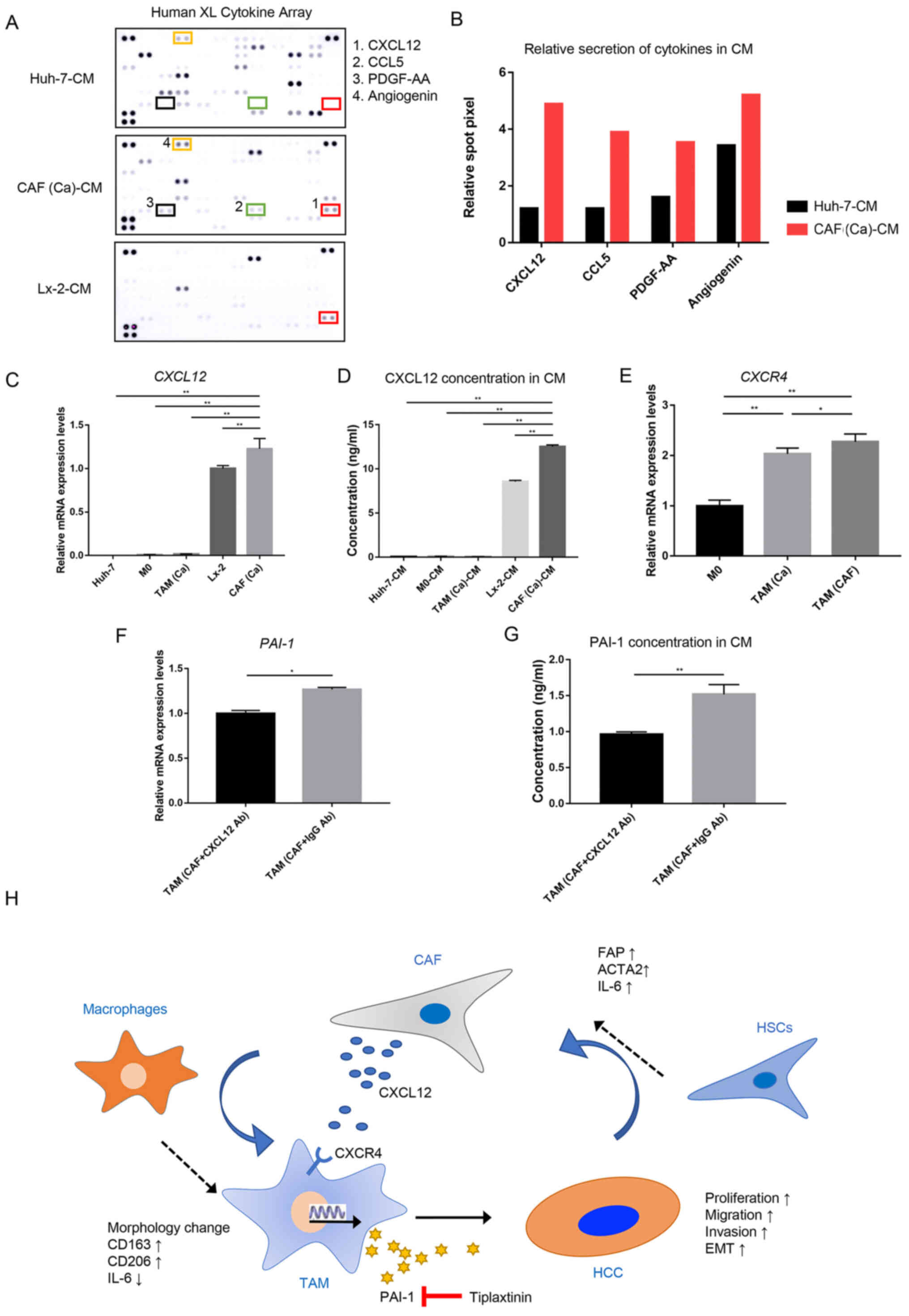|
1
|
Metcalf KJ, Alazzeh A, Werb Z and Weaver
VM: Leveraging microenvironmental synthetic lethalities to treat
cancer. J Clin Invest. 131:e1437652021. View Article : Google Scholar
|
|
2
|
Quail DF and Joyce JA: Microenvironmental
regulation of tumor progression and metastasis. Nat Med.
19:1423–1437. 2013. View
Article : Google Scholar : PubMed/NCBI
|
|
3
|
Bejarano L, Jordāo MJ and Joyce JA:
Therapeutic targeting of the tumor microenvironment. Cancer Discov.
11:933–959. 2021. View Article : Google Scholar : PubMed/NCBI
|
|
4
|
Comito G, Giannoni E, Segura CP,
Barcellos-de-Souza P, Raspollini MR, Baroni G, Lanciotti M, Serni S
and Chiarugi P: Cancer-associated fibroblasts and M2-polarized
macrophages synergize during prostate carcinoma progression.
Oncogene. 33:2423–2431. 2014. View Article : Google Scholar
|
|
5
|
Andersson P, Yang Y, Hosaka K, Zhang Y,
Fischer C, Braun H, Liu S, Yu G, Liu S, Beyaert R, et al: Molecular
mechanisms of IL-33-mediated stromal interactions in cancer
metastasis. JCI Insight. 3:e1223752018. View Article : Google Scholar
|
|
6
|
Feng R, Morine Y, Ikemoto T, Imura S,
Iwahashi S, Saito Y and Shimada M: Nrf2 activation drive
macrophages polarization and cancer cell epithelial-mesenchymal
transition during interaction. Cell Commun Signal. 16:542018.
View Article : Google Scholar : PubMed/NCBI
|
|
7
|
Kang JI, Kim DH, Sung KW, Shim SM,
Cha-Molstad H, Soung NK, Lee KH, Hwang J, Lee HG, Kwon YT and Kim
BY: p62-Induced cancer-associated fibroblast activation via the
nrf2-atf6 pathway promotes lung tumorigenesis. Cancers (Basel).
13:8642021. View Article : Google Scholar
|
|
8
|
Torre LA, Bray F, Siegel RL, Ferlay J,
Lortet-Tieulent J and Jemal A: Global cancer statistics, 2012. CA
Cancer J Clin. 65:87–108. 2015. View Article : Google Scholar : PubMed/NCBI
|
|
9
|
Wu Q, Zhou LY, Lv DD, Zhu X and Tang H:
Exosome-mediated communication in the tumor microenvironment
contributes to hepatocellular carcinoma development and
progression. J Hematol Oncol. 12:532019. View Article : Google Scholar : PubMed/NCBI
|
|
10
|
Higashino N, Koma YI, Hosono M, Takase N,
Okamoto M, Kodaira H, Nishio M, Shigeoka M, Kakeji Y and Yokozaki
H: Fibroblast activation protein-positive fibroblasts promote tumor
progression through secretion of CCL2 and interleukin-6 in
esophageal squamous cell carcinoma. Lab Invest. 99:777–792. 2019.
View Article : Google Scholar : PubMed/NCBI
|
|
11
|
Hashimoto O, Yoshida M, Koma YI, Yanai T,
Hasegawa D, Kosaka Y, Nishimura N and Yokozaki H: Collaboration of
cancer-associated fibroblasts and tumour-associated macrophages for
neuroblastoma development. J Pathol. 240:211–223. 2016. View Article : Google Scholar : PubMed/NCBI
|
|
12
|
Yang X, Lin Y, Shi Y, Li B, Liu W, Yin W,
Dang Y, Chu Y, Fan J and He R: Fap promotes immunosuppression by
cancer-associated fibroblasts in the tumor microenvironment via
STAT3-CCL2 signaling. Cancer Res. 76:4124–4135. 2016. View Article : Google Scholar : PubMed/NCBI
|
|
13
|
Allaoui R, Bergenfelz C, Mohlin S,
Hagerling C, Salari K, Werb Z, Anderson RL, Ethier SP, Jirström K,
Påhlman S, et al: Cancer-associated fibroblast-secreted CXCL16
attracts monocytes to promote stroma activation in triple-negative
breast cancers. Nat Commun. 7:130502016. View Article : Google Scholar : PubMed/NCBI
|
|
14
|
Cho H, Seo Y, Loke KM, Kim SW, Oh SM, Kim
JH, Soh J, Kim HS, Lee H, Kim J, et al: Cancer-stimulated cafs
enhance monocyte differentiation and protumoral tam activation via
il6 and GM-CSF secretion. Clin Cancer Res. 24:5407–5421. 2018.
View Article : Google Scholar : PubMed/NCBI
|
|
15
|
Ji J, Eggert T, Budhu A, Forgues M, Takai
A, Dang H, Ye Q, Lee JS, Kim JH, Greten TF and Wang XW: Hepatic
stellate cell and monocyte interaction contributes to poor
prognosis in hepatocellular carcinoma. Hepatology. 62:481–495.
2015. View Article : Google Scholar : PubMed/NCBI
|
|
16
|
Kubala MH and DeClerck YA: The plasminogen
activator inhibitor-1 paradox in cancer: A mechanistic
understanding. Cancer Metastasis Rev. 38:483–492. 2019. View Article : Google Scholar : PubMed/NCBI
|
|
17
|
Li SJ, Wei XH, Zhan XM, He JY, Zeng YQ,
Tian XM, Yuan ST and Sun L: Adipocyte-derived leptin promotes
PAI-1-mediated breast cancer metastasis in a STAT3/miR-34a
dependent manner. Cancers (Basel). 12:38642020. View Article : Google Scholar
|
|
18
|
Mashiko S, Kitatani K, Toyoshima M,
Ichimura A, Dan T, Usui T, Ishibashi M, Shigeta S, Nagase S, Miyata
T and Yaegashi N: Inhibition of plasminogen activator inhibitor-1
is a potential therapeutic strategy in ovarian cancer. Cancer Biol
Ther. 16:253–260. 2015. View Article : Google Scholar : PubMed/NCBI
|
|
19
|
Muñoz-Galván S, Rivero M, Peinado-Serrano
J, Martinez-Pérez J, Fernández-Fernández MC, Ortiz MJ,
García-Heredia JM and Carnero A: PAI1 is a marker of bad prognosis
in rectal cancer but predicts a better response to treatment with
PIM inhibitor AZD1208. Cells. 9:10712020. View Article : Google Scholar :
|
|
20
|
Fang H, Placencio VR and DeClerck YA:
Protumorigenic activity of plasminogen activator inhibitor-1
through an antiapoptotic function. J Natl Cancer Inst.
104:1470–1484. 2012. View Article : Google Scholar : PubMed/NCBI
|
|
21
|
Placencio VR and DeClerck YA: Plasminogen
activator inhibitor-1 in cancer: Rationale and insight for future
therapeutic testing. Cancer Res. 75:2969–2974. 2015. View Article : Google Scholar : PubMed/NCBI
|
|
22
|
Jin Y, Liang ZY, Zhou WX and Zhou L:
Expression, clinicopathologic and prognostic significance of
plasminogen activator inhibitor 1 in hepatocellular carcinoma.
Cancer Biomark. 27:285–293. 2020. View Article : Google Scholar
|
|
23
|
Livak KJ and Schmittgen TD: Analysis of
relative gene expression data using real-time quantitative PCR and
the 2(-Delta Delta C(T)) method. Methods. 25:402–408. 2001.
View Article : Google Scholar
|
|
24
|
Zhang J, Zhang Q, Lou Y, Fu Q, Chen Q, Wei
T, Yang JQ, Tang J, Wang J, Chen Y, et al: Hypoxia-inducible
factor-1α/interleukin-1β signaling enhances hepatoma
epithelial-mesenchymal transition through macrophages in a
hypoxic-inflammatory microenvironment. Hepatology. 67:1872–1889.
2018. View Article : Google Scholar
|
|
25
|
Dahlem C, Siow WX, Lopatniuk M, Tse WK,
Kessler SM, Kirsch SH, Hoppstädter J, Vollmar AM, Müller R,
Luzhetskyy A, et al: Thioholgamide A, a new anti-proliferative
anti-tumor agent, modulates macrophage polarization and metabolism.
Cancers (Basel). 12:12882020. View Article : Google Scholar
|
|
26
|
Che Y, Wang JN, Li Y, Lu ZL, Huang JB, Sun
SG, Mao SS, Lei YY, Zang RC, Sun N and He J: Cisplatin-activated
PAI-1 secretion in the cancer-associated fibroblasts with paracrine
effects promoting esophageal squamous cell carcinoma progression
and causing chemoresistance. Cell Death Dis. 9:7592018. View Article : Google Scholar : PubMed/NCBI
|
|
27
|
Oh JW, Olman M and Benveniste EN:
CXCL12-mediated induction of plasminogen activator inhibitor-1
expression in human CXCR4 positive astroglioma cells. Biol Pharm
Bull. 32:573–577. 2009. View Article : Google Scholar : PubMed/NCBI
|
|
28
|
Phillips RJ, Burdick MD, Lutz M, Belperio
JA, Keane MP and Strieter RM: The stromal derived
factor-1/CXCL12-CXC chemokine receptor 4 biological axis in
non-small cell lung cancer metastases. Am J Respir Crit Care Med.
167:1676–1686. 2003. View Article : Google Scholar : PubMed/NCBI
|
|
29
|
Yin ZL, Dong CY, Jiang KQ, Xu Z, Li R, Guo
K, Shao SJ and Wang L: Heterogeneity of cancer-associated
fibroblasts and roles in the progression, prognosis, and therapy of
hepatocellular carcinoma. J Hematol Oncol. 12:1012019. View Article : Google Scholar : PubMed/NCBI
|
|
30
|
Pham K, Huynh D, Le L, Delitto D, Yang L,
Huang J, Kang Y, Steinberg MB, Li J, Zhang L, et al: E-cigarette
promotes breast carcinoma progression and lung metastasis:
Macrophage-tumor cells crosstalk and the role of CCL5 and VCAM-1.
Cancer Lett. 491:132–145. 2020. View Article : Google Scholar : PubMed/NCBI
|
|
31
|
Yan W, Liu X, Ma H, Zhang H, Song X, Gao
L, Liang X and Ma C: Tim-3 fosters HCC development by enhancing
TGF-β-mediated alternative activation of macrophages. Gut.
64:1593–1604. 2015. View Article : Google Scholar : PubMed/NCBI
|
|
32
|
Franklin RA, Liao W, Sarkar A, Kim MV,
Bivona MR, Liu K, Pamer EG and Li MO: The cellular and molecular
origin of tumor-associated macrophages. Science. 344:921–925. 2014.
View Article : Google Scholar : PubMed/NCBI
|
|
33
|
Yin Z, Ma TT, Lin Y, Lu X, Zhang CZ, Chen
S and Jian ZX: IL-6/STAT3 pathway intermediates M1/M2 macrophage
polarization during the development of hepatocellular carcinoma. J
Cell Biochem. 119:9419–9432. 2018. View Article : Google Scholar : PubMed/NCBI
|
|
34
|
Wang Q, He Z, Huang M, Liu T, Wang Y, Xu
H, Duan H, Ma P, Zhang L, Zamvil SS, et al: Vascular niche IL-6
induces alternative macrophage activation in glioblastoma through
HIF-2α. Nat Commun. 9:5592018. View Article : Google Scholar
|
|
35
|
Augsten M, Sjöberg E, Frings O, Vorrink
SU, Frijhoff J, Olsson E, Borg A and Östman A: Cancer-associated
fibroblasts expressing CXCL14 rely upon NOS1-derived nitric oxide
signaling for their tumor-supporting properties. Cancer Res.
74:2999–3010. 2014. View Article : Google Scholar : PubMed/NCBI
|
|
36
|
Li X, Bu WH, Meng L, Liu XC, Wang SS,
Jiang LM, Ren MS, Fan Y and Sun HC: CXCL12/CXCR4 pathway
orchestrates CSC-like properties by CAF recruited tumor associated
macrophage in OSCC. Exp Cell Res. 378:131–138. 2019. View Article : Google Scholar : PubMed/NCBI
|
|
37
|
Murray PJ: Macrophage polarization. Annu
Rev Physiol. 79:541–566. 2017. View Article : Google Scholar
|
|
38
|
Huang CP, Liu LX and Shyr CR:
Tumor-associated macrophages facilitate bladder cancer progression
by increasing cell growth, migration, invasion and cytokine
expression. Anticancer Res. 40:2715–2724. 2020. View Article : Google Scholar : PubMed/NCBI
|
|
39
|
Feig C, Jones JO, Kraman M, Wells RJ,
Deonarine A, Chan DS, Connell CM, Roberts EW, Zhao Q, Caballero OL,
et al: Targeting CXCL12 from FAP-expressing carcinoma-associated
fibroblasts synergizes with anti-PD-L1 immunotherapy in pancreatic
cancer. Proc Natl Acad Sci U S A. 110:20212–20217. 2013. View Article : Google Scholar : PubMed/NCBI
|
|
40
|
Tan HX, Gong WZ, Zhou K, Xiao ZG, Hou FT,
Huang T, Zhang L, Dong HY, Zhang WL, Liu Y and Huang ZC:
CXCR4/TGF-β1 mediated hepatic stellate cells differentiation into
carcinoma-associated fibroblasts and promoted liver metastasis of
colon cancer. Cancer Biol Ther. 21:258–268. 2020. View Article : Google Scholar
|
|
41
|
Giacoia EG, Miyake M, Lawton A, Goodison S
and Rosser CJ: PAI-1 leads to G1-phase cell-cycle progression
through cyclin D3/cdk4/6 upregulation. Mol Cancer Res. 12:322–334.
2014. View Article : Google Scholar : PubMed/NCBI
|
|
42
|
Liu SL, Wu XS, Li FN, Yao WY, Wu ZY, Dong
P, Wang XF and Gong W: ERRα promotes pancreatic cancer progression
by enhancing the transcription of PAI1 and activating the MEK/ERK
pathway. Am J Cancer Res. 10:3622–3643. 2020.
|
|
43
|
Chen Y, Kelm RJ Jr, Budd RC, Sobel BE and
Schneider DJ: Inhibition of apoptosis and caspase-3 in vascular
smooth muscle cells by plasminogen activator inhibitor type-1. J
Cell Biochem. 92:178–188. 2004. View Article : Google Scholar : PubMed/NCBI
|
|
44
|
Wei X, Li S, He J, Du H, Liu Y, Yu W, Hu
H, Han L, Wang C, Li H, et al: Tumor-secreted PAI-1 promotes breast
cancer metastasis via the induction of adipocyte-derived collagen
remodeling. Cell Commun Signal. 17:582019. View Article : Google Scholar : PubMed/NCBI
|
|
45
|
Liu J, Chen Z, Huang M, Tang S, Wang Q, Hu
P, Gupta P, Ashby CR Jr, Chen ZS and Zhang L: Plasminogen activator
inhibitor (PAI) trap3, an exocellular peptide inhibitor of PAI-1,
attenuates the rearrangement of F-actin and migration of cancer
cells. Exp Cell Res. 391:1119872020. View Article : Google Scholar : PubMed/NCBI
|
|
46
|
Chen S, Kang X, Liu G, Zhang B, Hu X and
Feng Y: α7-Nicotinic acetylcholine receptor promotes
cholangiocarcinoma progression and epithelial-mesenchymal
transition process. Dig Dis Sci. 64:2843–2853. 2019. View Article : Google Scholar : PubMed/NCBI
|
|
47
|
Pal M, Bhattacharya S, Kalyan G and Hazra
S: Cadherin profiling for therapeutic interventions in epithelial
mesenchymal transition (EMT) and tumorigenesis. Exp Cell Res.
368:137–146. 2018. View Article : Google Scholar : PubMed/NCBI
|
|
48
|
Yang JD, Ma L and Zhu Z: SERPINE1 as a
cancer-promoting gene in gastric adenocarcinoma: Facilitates tumour
cell proliferation, migration, and invasion by regulating EMT. J
Chemother. 31:408–418. 2019. View Article : Google Scholar : PubMed/NCBI
|
|
49
|
Lin X, Lin BW, Chen XL, Zhang BL, Xiao XJ,
Shi JS, Lin JD and Chen X: PAI-1/PIAS3/Stat3/miR-34a forms a
positive feedback loop to promote EMT-mediated metastasis through
Stat3 signaling in non-small cell lung cancer. Biochem Biophys Res
Commun. 493:1464–1470. 2017. View Article : Google Scholar : PubMed/NCBI
|
|
50
|
Hennan JK, Morgan GA, Swillo RE, Antrilli
TM, Mugford C, Vlasuk GP, Gardell SJ and Crandall DL: Effect of
tiplaxtinin (PAI-039), an orally bioavailable PAI-1 antagonist, in
a rat model of thrombosis. J Thromb Haemost. 6:1558–1564.
2008.PubMed/NCBI
|
|
51
|
Gomes-Giacoia E, Miyake M, Goodison S and
Rosser CJ: Targeting plasminogen activator inhibitor-1 inhibits
angiogenesis and tumor growth in a human cancer xenograft model.
Mol Cancer Ther. 12:2697–2708. 2013. View Article : Google Scholar : PubMed/NCBI
|
|
52
|
Masuda T, Hattori N, Senoo T, Akita S,
Ishikawa N, Fujitaka K, Haruta Y, Murai H and Kohno N: SK-216, an
inhibitor of plasminogen activator inhibitor-1, limits tumor
progression and angiogenesis. Mol Cancer Ther. 12:2378–2388. 2013.
View Article : Google Scholar : PubMed/NCBI
|
|
53
|
Masuda T, Nakashima T, Namba M, Yamaguchi
K, Sakamoto S, Horimasu Y, Miyamoto S, Iwamoto H, Fujitaka K,
Miyata Y, et al: Inhibition of PAI-1 limits chemotherapy resistance
in lung cancer through suppressing myofibroblast characteristics of
cancer-associated fibroblasts. J Cell Mol Med. 23:2984–2994. 2019.
View Article : Google Scholar : PubMed/NCBI
|
|
54
|
Kubala MH, Punj V, Placencio-Hickok VR,
Fang H, Fernandez GE, Sposto R and DeClerck YA: Plasminogen
activator inhibitor-1 promotes the recruitment and polarization of
macrophages in cancer. Cell Rep. 25:2177–2191. 2018. View Article : Google Scholar : PubMed/NCBI
|















